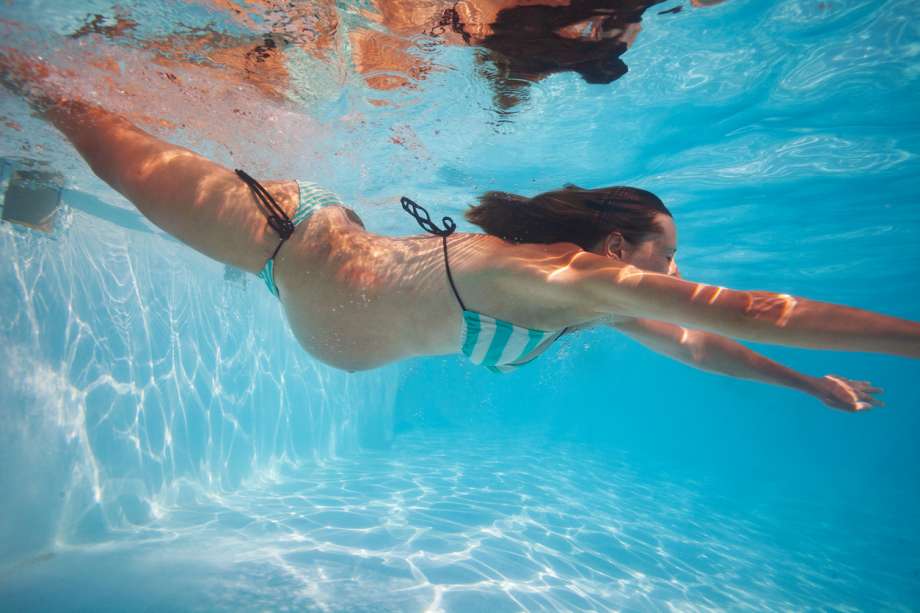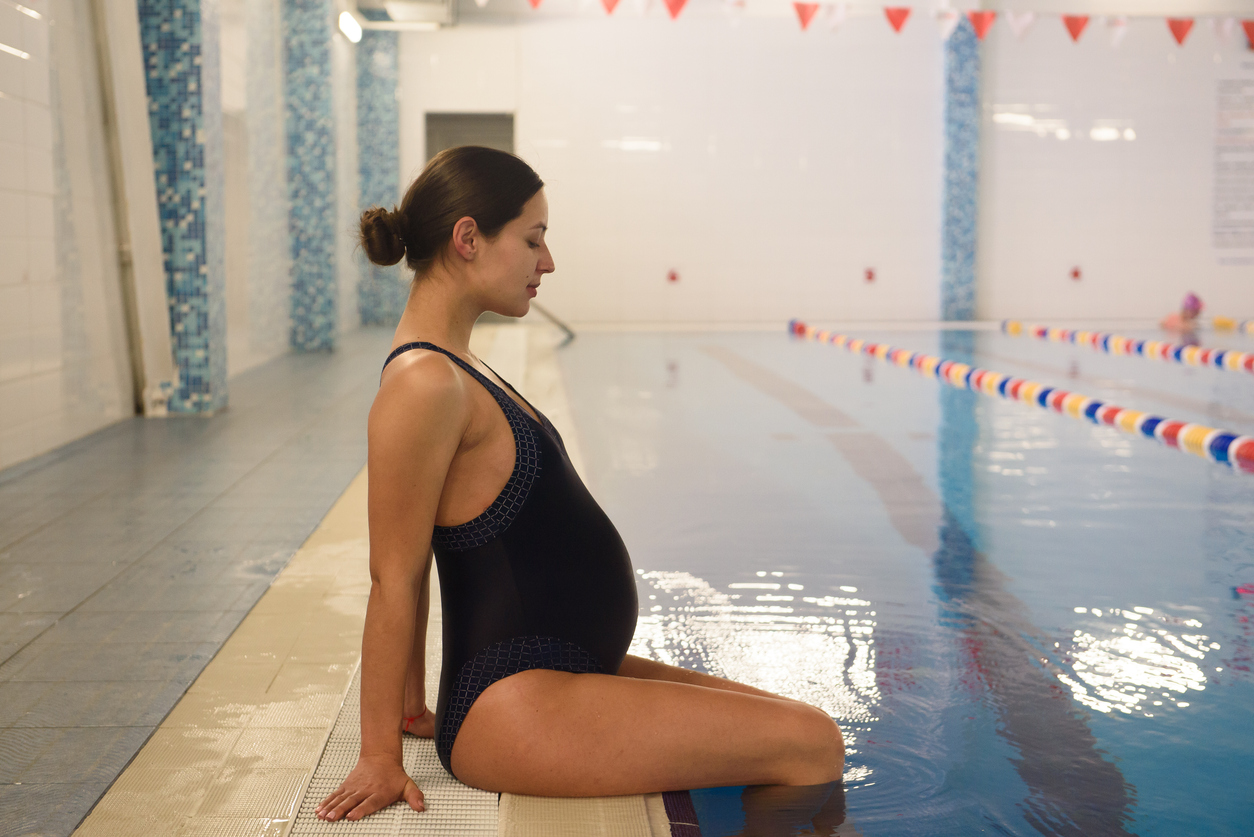Is It Safe to Swim in a Chlorine Pool While Pregnant?

Pregnant women are often concerned about the health and development of their unborn babies, especially with the increasing presence of harmful chemicals in the world today. Swimming in chlorine pools while pregnant is one activity pregnant women may want to reconsider due to the number of chemicals in swimming pools.
According to the American Chemical Society, swimming pools contain many chemicals, including muriatic acid, carbon dioxide, sulfuric acid, and sodium carbonate, with chlorine being the biggest concern. However, according to research, exposure to the levels of chlorine in most chlorine swimming pools has not been proven to harm pregnant women or their fetuses.
If you’re currently pregnant or trying to conceive, it’s important to understand the potential risks of daily activities like swimming on your developing baby to ensure you don’t expose your fetus to any toxic material.
Read on to learn more about the safety precautions of swimming in chlorine pools while pregnant and alternatives for swimming during pregnancy.
Related: Lifestyle Hazards to Avoid While Pregnant
Is Swimming Safe During Pregnancy?
Swimming is considered a safe exercise during pregnancy by the American College of Obstetricians and Gynecologists for women with no prior medical problems. According to Loma Linda University Health, swimming provides many health benefits for pregnant women because it is considered a low-impact exercise. Some of these health benefits are listed below.
- Swimming helps alleviate common pregnancy aches and pains felt during the first, second, and third trimesters of pregnancy. Some of these discomforts include morning sickness, back pain, muscle aches, and swelling by increasing blood circulation.
- According to the NHS, swimming relieves pregnant women by temporarily removing the weight of the baby bump off their bodies.
- Swimming also helps support the cardiovascular system and improves lung efficiency.
- Pregnant women typically suffer from overheating in summer. The cool water helps gradually decrease their body temperature.
- Swimming also helps pregnant women regulate their weight and prevent fast weight gain.
When Is Swimming Not Safe During Pregnancy?
Swimming and other types of exercise are not safe during pregnancy, according to the American College of Obstetricians and Gynecologists, for those with:
- Issues in the heart or lungs
- Cervical insufficiency
- Placenta previa beyond the 26th week of pregnancy.
- Preeclampsia
- Severe anemia
- Risk for preterm labor or are experiencing preterm labor
Is It Safe to Swim in a Chlorine Pool While Pregnant?
Yes, it is safe to swim in a chlorinated pool while pregnant. The National Library of Medicine (NIH) states that exposure to chlorine, the main chemical in swimming pools, does not harm pregnant women or their fetuses.
According to the NIH, researchers have also done fetal cardiotocography on pregnant women before and after swimming. The results showed that the fetuses were unaffected by antenatal swimming.
However, keep in mind that most pools have a healthy chlorine concentration. A healthy chlorine concentration is about one to three ppm, according to ACE Water. A five ppm chlorine concentration should not cause many side effects, but any chlorine concentration above five ppm could be harmful to everyone, regardless of pregnancy.
Open Water HQ states that swimming in bodies of water with a high concentration of chlorine can cause itchy skin, dry skin, rash, lung irritation, and nose, eye, and throat irritations.

Potential Risks of Chlorine Exposure During Pregnancy
Though most studies, including those done by UC Davis Health System, have concluded that swimming is a beneficial exercise during pregnancy and there is insufficient evidence to prove that chlorine in pools is harmful to the fetus, they did identify some potential risks of chlorine exposure during pregnancy.
Typically the effects of chlorine during pregnancy occur when the pregnant person/fetus has been exposed to a higher concentration of chlorine than is typical in public pools.
Miscarriage and Birth Defects
According to the Guardian, one research has concluded that pregnant women when exposed to chlorinated swimming pools could have an increased risk of miscarriage and birth defects. According to the study, chlorine in pools can react with skin cells or cosmetic products to produce DBPs (disinfectant by-products). DBPs are a form of trihalomethane (THM), which are harmful chemical substances.
Changes in Birth Outcomes
According to the NIH, research states that being exposed to chlorine and other DBPs found in the pool may cause a change in birth outcomes, specifically a change in the fetus’s head circumference.
The study indicated that pregnant women who occasionally swam in chlorinated pools had babies with larger head circumferences. In contrast, those who were regular swimmers had babies with smaller head circumferences. The chlorinated water did not affect the birth weight and length of the infant.
The study concluded that chlorinated water might have an influence on birth head circumference and that more research is needed to understand whether this change in head circumference is harmful to infants.
Alteration in Infant’s Cord Blood Proportions
According to ScienceDirect, not only can swimming cause a change in birth outcomes but also a change in cord blood proportions. Cord blood refers to the blood that remains in the placenta and umbilical cord after the birth of the child, according to the NHS.
Cord blood contains white blood cells, red blood cells, stem cells, and much more. The study concluded that swimming in chlorinated pool water can cause changes in cord blood proportions but does not state whether this change is harmful.
Swimming Safety Tips for Pregnant Women
According to Loma Linda University Health, there are a few swimming tips pregnant women should follow to enjoy this form of exercise safely.
- Ask about the pool’s water quality and make the chlorine concentration is within healthy limits.
- Wear safe footwear around the pool to avoid slipping.
- Wear sunscreen and reapply every few hours.
- Do not eat thirty minutes before swimming.
- Do not sit in hot tubs and saunas. The American Pregnancy Association states that a body temperature above 101 F can cause problems in the development of the baby’s spinal cord during the first trimester.
- Do not jump or dive into a swimming pool to avoid injury.
- Those who are not regular swimmers should start slowly, swimming for short durations.
- If you feel tired, stop swimming. Do not tire yourself.
- Wear a maternal swimsuit. Normal swimsuits do not provide enough room for the baby bump.
- Do not skip the cooling down period. You should stop gradually just as you would during any other physical activity.
Alternatives to Chlorine Pools During Pregnancy
Chorine is used in pool water to eliminate bacteria. However, it is a harsh substance that may cause unwanted side effects. Luckily, there are a few safer alternatives to disinfect your pool.
Saltwater Chlorination
According to Pool Research, those who are concerned about chlorine pools have a safer alternative. Saltwater pools are safer than chlorinated pools. The benefits of choosing a saltwater pool over a chemically chlorinated pool during pregnancy include:
- Chlorine generated from salt is less harsh.
- Saltwater pools have lower chlorine concentrations.
- Saltwater pools have fewer chemicals than chlorinated pools.
Ozonation
According to Intec America, using an ozone generator to sanitize pool water is safer than chlorinated pools. The pool still has chlorine but at a lower concentration. Ozonation also decomposes chemicals in the pool making it safer to swim in.
Lowering the Temperature of Pool Water
Intec America also states that lowering the temperature of pool water would slow down the growth of bacteria in pools. This would reduce the number of chemicals needed to sanitize the pool. However, make sure the water is not too cold because that can cause other problems.
Choosing a Different Exercise
Swimming is not the only form of exercise that is safe during pregnancy. Walking, jogging, yoga, pilates, squats, pelvic floor exercises, and lunges are all healthy during pregnancy, according to Mount Elizabeth Hospitals.
Kristie Alicea, the founder of ABC Fit Collective and a prenatal fitness consultant, claims that many fitness activities are safe to do throughout pregnancy and encourages women to exercise regularly to build endurance during delivery and speed up the healing process after labor.
Understand the Risks of Chlorine During Pregnancy
There are numerous toxins in the environment nowadays that can harm your fetus. Swimming in a chlorinated pool while pregnant, on the other hand, is deemed safe. All of the studies that have mentioned potential risks are too small for any conclusions. As a result, pregnant women should not be concerned about swimming in chlorinated pools.
Remember, that it is critical to enjoy this time and not become overly concerned about potential risks.

